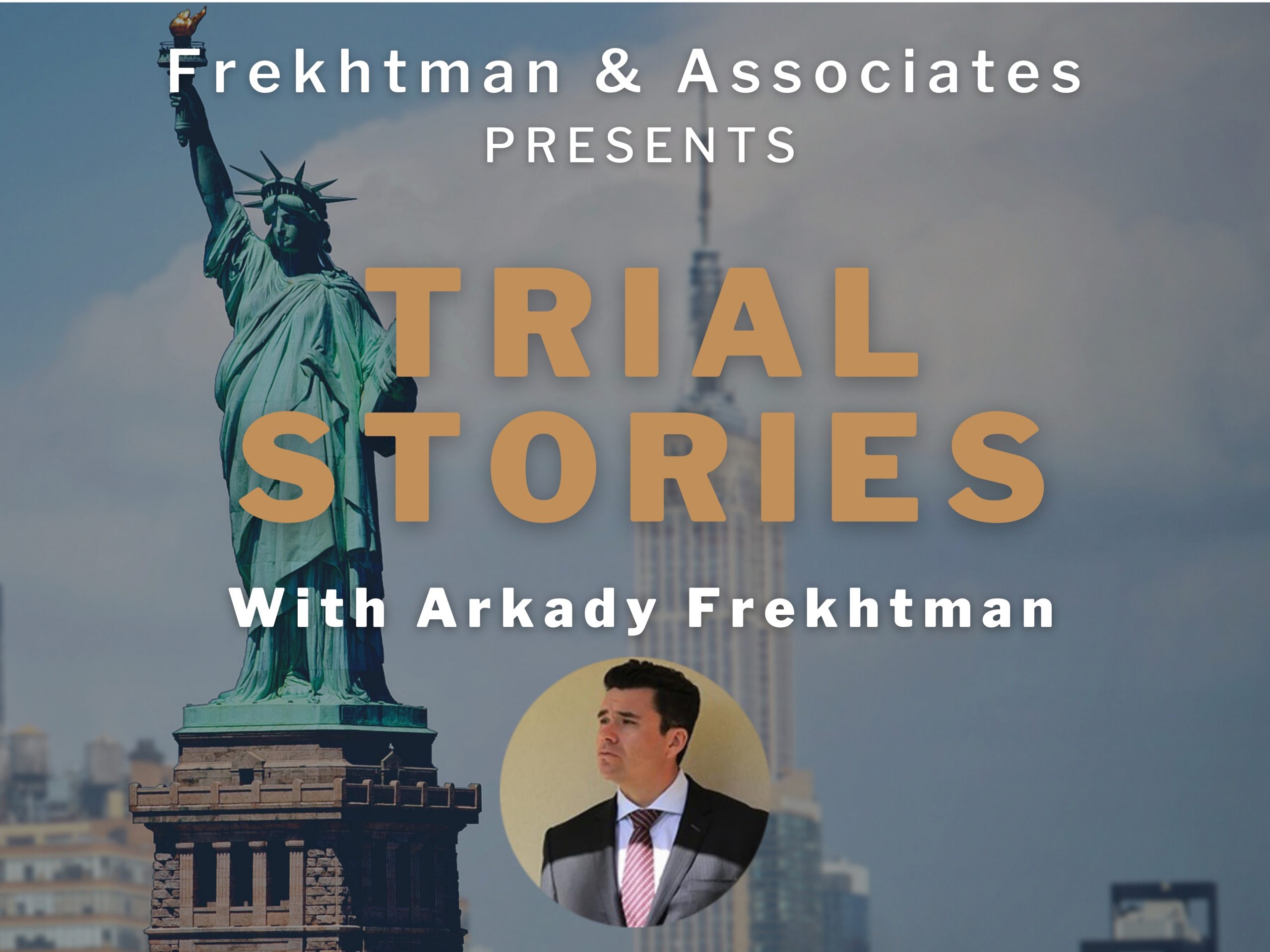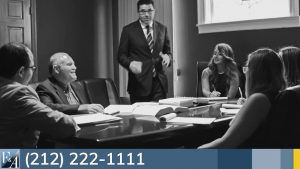EP 03 S 06: Answering Personal Injury FAQs – Meet The Team Series – Trial Stories

Meet the Frekhtman & Associates team in our new podcast episode! This week we meet Kelsey Monaghan and Michael Roitman.
Pick Your Favorite Channel: Apple Podcast | Google Podcasts | Spotify | Stitcher | RSS
Full Transcript:
Arkady Frekthman:
Hi, everybody. And welcome to the Trial Stories podcast. Today, we’re here with two attorneys from Frekhtman and Associates. We have Michael Roitman.
Michael Roitman:
Hello, everyone.
Arkady Frekthman:
And Kelsey Monaghan.
Kelsey Monaghan:
Hello.
Arkady Frekthman:
We were going to talk about a few different topics today, maybe cases they’ve handled, and different types of niches that they’ve gotten into. And then also we wanted to ask some questions that are interesting to them and interesting to you. We’re going to start off with the following question.
Q: What’s the biggest challenge that you’re facing in your role as an attorney with the firm right now, and how are you tackling it? Who wants to go first?
Michael Roitman:
I guess I could go first. I think the biggest challenge for me, obviously we’re in the pandemic, and it’s been preparing clients for depositions virtually as opposed to in person. And how do you tackle it? Basically, what people need to realize, and our potential clients need to realize is that depositions are very important in your case. It’s essentially the first time you get to tell your story of how the accident happened, and it gets written down, and it’s under oath by a court reporter. It’s very important to prepare for this. And before the pandemic, you would sit down, you would have all your evidence in front of you, all of your medical records and things like that. However, with a pandemic, it’s becoming more challenging, and it takes a little bit longer.
I think the key to tackling it is really preparing for the deposition in-depth and really outlining what documents you want to go over with your clients, like pre-marking the exhibits, pre-marking all of the photographs, and having all of your medical records organized an outline. That way you could save time, and you could adequately and properly without any errors and mistakes prepare your clients.
What I found is if you prepare properly, you can actually prepare the same way except virtually. You may need to do more than one prep, but that was something I had to adjust to due to the pandemic.
Arkady Frekthman:
Well, that’s interesting. Yeah, definitely. I see the same thing. Did you have one example of a deposition during the pandemic where the client was prepped the way you liked and everything went well?
Michael Roitman:

Our client sustained, obviously, tremendous injuries, had to undergo fusion surgery, and many other surgeries to her body.
It was a collision at 25 miles an hour, but the defendants were trying to make an emergency defense basically stating that the reason they swerve onto an oncoming lane is because a car was pulling out unexpectedly, and so they had no choice.
However, when I first spoke to the client over the phone, she told me that she actually saw that car pull out and that the car didn’t really pull out. And there were many photographs of the scene, there were Google images, printouts, satellite views, and as well as an extensive, extensive medical history. There were three firefighters that came to the scene. There were two police officers that came to the scene. Even a Hatzolah ambulance came to the scene.
And so to prepare somebody like that in person, you would be in a big conference room with all of these papers lying around, and you would go step by step. But to do it virtually, I had to spend almost over a day scanning all the documents, scanning all the exhibits that would possibly be used, going through the Google images, including Google maps, virtually, and then, going over through medical treatment, as well as limitations associated with it. I was used to doing it in person, and it was much easier because you would just reach for the paper, “Here, take a look at this photo,” reach for the paper, “Take a look at this photo,” show them, “Look at these medical records. Look at this police report.”
But when you have a hundred documents for a massive case like this, you have to realize that, hey, you’re not just going to put a picture in front of the screen. It doesn’t work. What do you do? You have to pre-scan it, prepared almost as if you would do it at time of trial, and you present that to the client to make sure that when the client testifies as to how this massive crash happened, they do it properly, because we all know what do the defendants try to do. They tried to confuse the client and try to hurt the case despite being responsible for the case. And so that was one of the challenges that I had to really overcome because of the pandemic and doing it virtually.
Arkady Frekthman:
Oh, okay. Well, thank you. That’s, that’s a good point. Kelsey, what has your experience been with doing depositions virtually?
Kelsey Monaghan:

It ends up being just a lot of information that our clients have to digest that I think is a product of remote depositions. Also too, backgrounds. You get to see everyone’s living room in Zoom, and so the technical aspect of having deposition testimony glitch in and out because of internet connection ends up being a hurdle that we have to overcome, especially if there’s a question that wasn’t fully understood that gets answered.
It is a learning curve. But I think we are very well prepared here to tackle that and prepare our clients for it with all the resources and support staff that we have. We’re very fortunate.
Arkady Frekthman:
And then that same question, would you… Like the biggest challenge question, the biggest challenge you’re facing in your role as an attorney right now, and how you’re tackling it? Would you say that it’s doing depositions or something else? Or what would you say to that?
Kelsey Monaghan:
I would say on cases where we have… Like I have a bicycle accident case right now, and there’s going to be several defendants 
Arkady Frekthman:
Yeah, of course. It’s difficult. Okay. And okay. And then the next question we have are what are the best resources that have helped you along the way in dealing with these challenges? What do you guys think? Maybe Michael, what do you think? What are the best tools or resources?
Michael Roitman:
Sure. I think what’s very fortunate personally for me is the organization of our firm. We do weekly meetings every Monday or Tuesday, a group of attorneys that are assigned to our pod, as we call it, we meet and we go through all of our cases and meet 
Especially, webinars such as Trial By Human, and Books Like That, which are all part of our firm and are shared throughout firm so that we can co cohesively together properly prosecute our cases and deliver the highest compensation for our clients.
I think those resources that are provided by the firm, the firm’s experience, as well as all the different videos that we watch, all the different treatises that we read, and all the webinars that we attend to keep becoming up a professional and to practice law because law you practice. You have to keep doing it and getting better at it every day. And the system that we have set up in our firm, which allows us to do that, I think has been extremely, extremely helpful to my success and to the success of the firm.
Arkady Frekthman:
Yeah, during the pandemic, there were a lot of webinars going on, everything from just trial practice to jury selection, like Trial By Human. There was Trial Lawyers University. They had one almost daily. And then they had some in-person retreats. I went to one out in Montana over the summer. That was really helpful. And then they not only teach you how to do the trial, but also they have books on settlements and opening-up policies and all different aspects of litigation. Yeah, that’s definitely a great resource. And all the different technology that’s available now, and you could have everything at your fingertips, whether you need to know something about evidence or something about case law with Westlaw or evidence treatises, you have access to everything at your fingertips. That’s really cool.
Michael Roitman:
Yeah. Precisely, precisely. I couldn’t agree more.
Arkady Frekthman:
And yeah, I guess we could also talk about some cases that we’ve handled, maybe some cases to tell some stories or some examples of cases that we’ve handled. Does anything come to mind? I know last time I worked on a case where or actually we worked a little bit on the case together with where a woman was caused to fall due to an unsafe condition in an apartment building, and we got a good result, and it was during the pandemic. I think, Michael, you were primary on that case. Can you talk a little bit about that?
Michael Roitman:
Yeah, sure. Basically, the woman was caused to trip and fall as a result of a defective pathway in the courtyard of her building. And so there were two major issues in that case where the defendants were liable. Number one, it was extremely dark, and 
After depositions, which was super important in that case, because what do the defendants argue in courtyard cases? Well, you’ve been there a thousand times. You should have known what’s going on, you should have seen all of those defects, and really it’s not our fault. They tried to shift all the blame on our client. And throughout the litigation, we were able to get testimony from the plaintiff, which was very good for us. We were able to do a deposition of the defendant and obtain records through discovery as well through FOIL requests, as well as from the buildings’ department, which was very helpful for us. And ultimately the case went to mediation, and then settled for $1.8 million.
Arkady Frekthman:
Excellent. That’s really good. Okay. No, that’s great. And what about you, Kelsey? Do you have either the best resource that has helped you in your daily day-to-day work or maybe a case you want to share with us?
Kelsey Monaghan:
Sure. Both as far as day to day, I think our case management software and our frequent memo writing on all of our cases are very important, where we keep track of all the liability, the status of the case. And also it seems that it’s not just one set of eyes that’s looking at anything that’s going out. We have it go through at least two attorneys, and that we’re all on the same page with litigation strategies.
I think that’s invaluable to have such a strong teamwork with the firm. I also think too, just going through and meeting people, having friends outside of the firm, maybe on the other side that I can bounce, “What do you think about this as a defense attorney?” And get a very candid answer has been a great asset as well. In cases recently that I’ve worked on, actually this afternoon, I was going through records for a traumatic brain injury case, and again, we have a memo on it. We have liability established. And my review of it and going through written discovery has become so much easier, because we have the system in place.
Arkady Frekthman:
Oh, that’s awesome. That’s awesome.
Kelsey Monaghan:
Yeah.
Arkady Frekthman:
Okay. And then, and the final question for today, what is one common myth about your profession or field that you want to debunk? What do you guys think?
Michael Roitman:
For me personally, whenever I’m in a public setting, people always ask, “Oh, so what do you do for a living?” And I’m like, “Well, I’m personally injury attorney.” And then what else naturally comes to people’s mind? “Oh, you’re, an ambulance chaser. You’re a schemer or not an honest person.” But really it’s the complete opposite.
We are actually placed in the position of ultimate trust with our clients, right? Because what is the purpose of obtaining an attorney, a personal injury attorney, a person who’s going to tell you the truth, who you’re going to work with, who you build the trust with, who learns your story, who you share your story with. Right? Because that’s how you represent the client who’s been hurt. Right? You have to learn about them, learn about their families, learn about their kids, learn about their relatives, and also share with them because the only way you can possibly put yourself in the shoe of a person who’s been injured and who’s in pain and who’s probably going to be in pain or limited in some sort of way for the rest of their life is to really make yourself part of their family.
When people say that, “Oh, you’re an ambulance chaser,” it bothers me to tell you the truth on the inside. I want to tell them like, “You just don’t realize. You don’t walk in people’s shoes that are injured. You’re lucky you haven’t been hurt.” But every single day we talk to people who have been injured, who rely on us for help and to represent them. And that’s what we do. That’s what my passion is. That’s why I became a trial attorney to do that for our clients. And so it ticks me off when I hear that. I don’t hear it all the time, but I’ve heard it enough to the point where it rubs me the wrong way.
Arkady Frekthman:
Yeah, no, I agree with you. I agree with you. I think some people think of it that way. Maybe that’s the old school way of thinking of it, or maybe it comes about from tort reform, because the insurance companies want to disseminate that message, because then they can just collect their premiums. But then when something happens, they don’t have to pay, because they can just brand all attorneys as ambulance chasers. Right? There probably is some people I’m sure as attorneys, who do have that mindset where, “Oh, if I obtain a big result for the client, I’m going to get paid.” So then that greed comes into it.
But I don’t think that all attorneys and personal injury attorneys are ambulance chasers. It just depends how you look at it, right? If you look at it that way, the profit, but it’s not really profit. Ultimately it’s about the client. Right? And it’s about getting them their justice. You could be considered a civil justice warrior because you’re out there. You have to be fearless. You’re up against billion-dollar insurance companies and corporate interests, and you have to go into court and then you have to try to win. And if you don’t win, you get nothing. You have to be very fearless to do that.
Michael Roitman:
Absolutely, Arkady. Yeah. It has its challenges, but it’s worth it, because you try to put somebody back as much as you can, even though you know you’re never going to do it. A lot of our clients never get their health back, unfortunately. It’s not an easy task or an easy, I don’t even want to call it job, but ultimately when you can at least do something to make a person feel better. And I think that’s really ultimately what I try to do.
Arkady Frekthman:
Right, right. That’s a good point too, because yeah, they can’t get their health back. That’s something that’s ultimately priceless. 
Or whether it’s something more serious, like it’s traumatic brain injury where they’re never the same person again, we have to obtain that value from a jury of strangers. And sometimes we compare it to other things, like we say, “Oh, what if it was a case about, let’s say, a very expensive airplane, and the airplane got destroyed.”
Well, you could pay money and you could just build another airplane or you could fix it now it’s a brand new airplane, but with a human, you just can’t, right? No matter what money. No matter if you gave billions and billions of dollars, some things are just irreplaceable, and then that’s why they’re priceless. That’s an interesting point. How about you, Kelsey? What do you think about this issue or another myth, if you have another myth?
Kelsey Monaghan:
Whenever I think about the ambulance chaser comment, because it’s the low-hanging fruit. It’s the easy answer when someone hears that you’re doing personal injury. It’s like, okay, but there are so many insurance companies that are publicly traded, and you can buy stock in, so it’s a business. And I think people that haven’t gone through the personal injury lawsuit process or claim process, it’s daunting and it’s aggressive from the insurance side like they will come at you, and they will send you these offers to settle that you’re like, “Well, I guess this is all my cases worth.” I feel like we really are in a position to help our clients, because how would you know, like you said, it’s a value question. How would you know that a fracture is not only worth a thousand dollars to just pay your medical expenses or how would you know that maybe down the road you’re going to continue to have issues? That’s where we come in, and we can council. We say you need to think about where you’re going to be in five years, 10 years, will you need physical therapy intermittently or chiropractic treatment.
And that’s something… Why would someone ever think about that unless they’ve been through this process? And we have a lot of experience at the firm handling these cases. So it is. It’s a very unique position of trust. Having been in a couple car accidents myself, I can personally attest to it. It’s a scary thing. And you don’t want to be that person that sues the insurance company, because it’s almost a weird stigma that insurance is filtered into our brains like, “Oh, all personal injury lawsuits are frivolous,” when in fact it’s like, “Well I have all these medical bills that I can’t pay. You were the cause of my injury, and I need help getting that payment.” A lot of the time, even personal injury protection insurance, PIP, will deny claims just arbitrarily, for no reason when you’re in fact very injured.
Yeah. And another myth, I think, is that all attorneys are very aggressive. Now we are definitely aggressive, but we are nice. We’re nice people. We’re not jerks.
Arkady Frekthman:
Yeah. We have to be nice with the clients, and then be accommodating. Sometimes I almost feel like a therapist sometimes, because they have so many worries and so many questions, you have to calm them down, and be like a mediator among different people. And yeah, that’s really cool.
Michael Roitman:
For sure. Definitely. Definitely. You have to almost explain to them everything is going to be right, because it’s very scary when somebody is hurt, especially when it’s the fault of someone else.
Arkady Frekthman:
Yeah. Yeah. That’s definitely true. And Kelsey, I wanted to ask you, because I know before you came to work here, you worked in the criminal law field. Right? And you did criminal trials. Can you talk about that a little bit, and how the transition was from criminal to civil?
Kelsey Monaghan:
Definitely. It’s different… There’s still a time crunch, but it’s not as you have a client in jail. But a lot of the time, it’s the same crisis where you have people that need things very quickly, and that they, as you said, they’re scared, they’re injured. And the consequences are ending up being dire because if you have all these medical records that you can’t pay for, and you can’t work anymore, you are essentially just disenfranchised from the hands of someone else.
I’ve had a lot of interpersonal people experience from that, because dealing in criminal law, you have personality types from all walks of life. And that’s from the police officers. That’s from clients. That’s from the judges. You get exposure to a lot of different people in the courtroom. And having things just thrown at you nonstop, I had a very high case count coming into civil. I feel like I was doing pushups, waiting to go into civil, so when I came in I was like, “Okay, we got this. Let’s go.”
A lot of the research too was very helpful with constitutional issues, motion practice. And so it’s different in the sense of the technical aspects of the law, but there’s a lot of procedural things that just have different terms, aren’t necessarily huge changes.
Arkady Frekthman:
Okay. No, that’s cool. Yeah. I was thinking that’s probably one of the really good practices that you got because being in a trial in a criminal, you never know what the police officer’s going to say or what a witness is going to say. You have to really be like a true trial lawyer in that you have to think on your feet. And it happens in civil as well. Or you never know what an expert for the defense is going to say or a witness or you have to be ready for anything. You have to be fearless. That’s really cool.
Kelsey Monaghan:
My last criminal trial, actually the victim in the case got arrested, and my client walked out of jail free that day. He got arrested while in the courtroom for his trial.
Arkady Frekthman:
Wow. Sounds like a TV show.
Kelsey Monaghan:
You never know what’s going to happen. It really was, because I cross-examined him on the stand after he was already arrested, and he wanted to jump over the table at me.
Arkady Frekthman:
Wow.
Kelsey Monaghan:
Yep. But my client was happy. He got to go home. He didn’t face 10 years.
Arkady Frekthman:
That’s amazing. Yeah. That’s great. Yeah. You feel a real sense of accomplishment when you help someone like that because they’re facing jail time or a prison time and you get them. When I started practicing, I also had a case where somebody was accused of felony assault, and they wanted to give him eight years, and it was a Russian interpreter. And the Russian interpreter told him at the council table before the judge, and he was like, “You know what, I’ll just take it.” And I was like, “No, no, don’t take it. Don’t take it. You’re going to do eight years. Don’t take it.” And then I took it to trial, and then I ended up getting a not guilty verdict. He was convicted of a misdemeanor with no jail time. After that, he was so happy. He gave me big hug, and his whole family were… He was a young guy. He was like 38, and we had a strong defense. I still remember that even though it was like, I don’t know, 15 years ago and I first started, but I still remember that because it’s a real sense of accomplishment. You’re helping someone on a human level. So it’s really cool.
Kelsey Monaghan:
I think that’s a big benefit of being in personal injury too, is that you’re still interacting with people on a day-to-day basis that can really use your help, where you still get that warm and fuzzy feeling like you’re really helping someone else out.
Arkady Frekthman:
Yeah. Yeah. Exactly. Exactly. Yeah. You’re sometimes going to their house or doing a Zoom call with them, finding out a little bit about their biography. Then you could really have that fire burning inside you. And when you’re before a jury in the courtroom, you can really know the person, so you could really do a good job and be their advocate.
Get Legal Help in New York
If you have suffered a personal injury due to someone else’s negligence, you need to contact our specialized lawyers. We will carefully investigate all the facts of your case, review all your medical records, and then fight hard to win the maximum compensation available to you. We want every client to fully recover for all lost wages, pain and suffering, medical expenses, and other losses.
Video Version:




